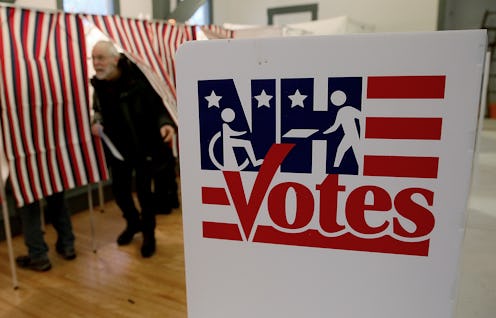News
Here's How The Winner-Takes-All Elector Rule Works
It's well known the vote you cast for president at the polls on Election Day isn't the vote that lands a candidate in the Oval Office. The popular vote, in other words, isn't the only one that matters. While not every ballot in a state will be cast for the same candidate, most states opt to give all of their Electoral College votes to only one candidate in a winner-take-all elector system. But what exactly is the winner-take-all rule used in the presidential election?
To understand the winner-take-all elector system, it's important to understand how U.S. presidential elections work. In the general election, voters cast ballots for their preferred team of presidential and vice presidential candidates. However, while ballots may list the names of presidential hopefuls, voters are actually voting for a slate of electors pledged to their preferred candidate in the Electoral College.
A state is allocated a certain number of electors based on the size of its Congressional representatives, which is based on a state's population size. The District of Columbia is allocated three electors per the twenty-third Amendment. Every elector receives one vote within the Electoral College. In order to win a presidential election, a candidate must win a majority of the Electoral College's 538 electoral votes.
The District of Columbia and all but two states allocate their Electoral College votes using a winner-take-all method, meaning the candidate who receives the majority of votes in the state's popular vote (also known as the plurality winner) takes all of that state's electoral votes. Maine and Nebraska are the only states that do not use a winner-take-all elector system during presidential elections, choosing to instead split their elector.
Yet, the Electoral College and the winner-take-all rule employed by most states isn't without controversy. Some argue it's an unfair system because it allows for the possibility that the candidate taking the majority of votes in the nation's popular vote might not win a majority in the Electoral College and thus lose out on the presidency. In 2000, Democratic nominee Al Gore won 50,999,897 votes to Republican nominee George W. Bush's 50,456,002 votes in the nationwide popular vote. However, Gore won only 266 electoral votes, while Bush won 271 votes in the Electoral College and was named the next president.
Although there's some debate surrounding the winner-take-all elector system used in presidential elections, it's been around since about 1824 and isn't likely to be eliminated anytime soon.
